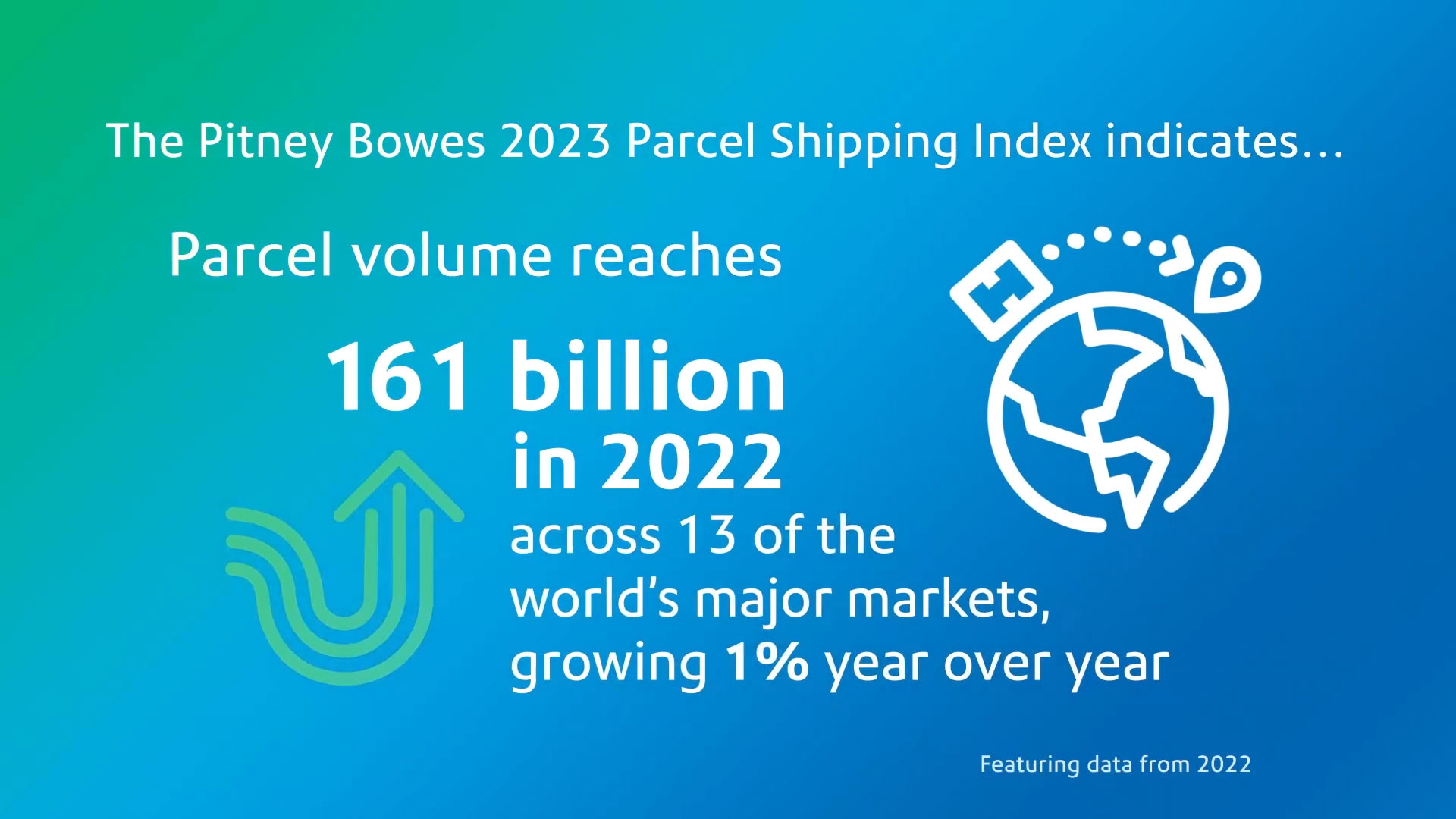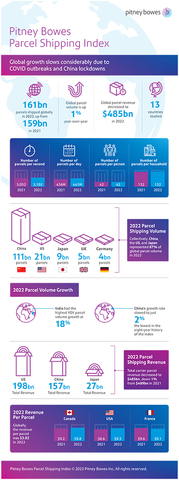STAMFORD, Conn.--(BUSINESS WIRE)--Pitney Bowes Inc. (NYSE: PBI), a global shipping and mailing company that provides technology, logistics, and financial services, today released their Global Parcel Shipping Index, unveiling ‘22 data from 13 major countries worldwide. The Index highlights that global parcel volume reached 161 billion in ‘22, equivalent to 5,102 parcels shipped every second marking a 1 percent increase from ‘21. Notably, the Index reveals China’s parcels experienced the slowest growth in its history, reaching 111 billion parcels in ‘22, with only a 2 percent increase.
The Index estimates parcel volume will most likely reach 225 billion by 2028, with a 6% CAGR ‘23-’28, a change from 8% forecasted last year.
“China parcel volume had maintained a double-digit growth rate every year from ‘13 to ’21. However, in ‘22, COVID-related lockdowns caused a sharp slowdown,” stated Gregg Zegras, Executive Vice President, Global Ecommerce at Pitney Bowes. “As the world’s second-largest economy, China is experiencing a frail pace of growth during its COVID recovery. We’re seeing volume slowdown, declining ecommerce sales, and an overall weak economy, projecting a 7 percent parcel volume CAGR ’23 -‘28.” Pre-pandemic China parcel volume forecast was 25 percent CAGR ‘18-’22 and actual volume growth was lower, at 22 percent CAGR ‘18-’22.
Over the past seven years, global parcel volume surged by 150 percent from 64 billion parcels in ‘16 to 161 billion in ‘22. In ‘22, India led with the highest increase at 18 percent driven by ecommerce expansion, while Italy (4 percent), China (2 percent) Australia (2 percent) and Brazil (2 percent) also showed growth. However, Sweden and Canada experienced significant declines at –11 percent and –9 percent respectively.
In '22, global parcel revenue declined by 1 percent to $485 billion, impacted by strong USD and its increase in value compared to other currencies in the Index.
Only the US, Brazil, India, and Australia saw growth in parcel revenue, with the US leading in carrier revenue with 7 percent growth in ‘22. Revenue per parcel varied significantly, with Canada highest at $9.8, followed by the US at $9.3 and France at $9.1. Despite lower volume, the US generated more revenue than China due to a significantly higher fee per parcel – almost seven times that of China. China's revenue per parcel is $1.4, the lowest globally, followed by India at $1.7 and Norway at $1.9.
Key findings from the latest Parcel Shipping Index include:
- Parcel volume reached 161 billion in ‘22, up 1 percent from 159 billion in ‘21
- 5,102 parcels shipped per second compared to 5,052 in ‘21
- Parcel revenue was $485 billion, down 1 percent from $489 billion in ‘21
- Highest CAGR ‘17- ‘22 for parcel volume was generated by China at 23 percent, followed by Brazil at 20 percent
- Highest CAGR ’17-’22 for parcel revenue was generated by China at 17 percent, followed by the US at 13 percent and Italy at 12 percent
- China remains the largest parcel volume market, contributing to the slow volume growth in ’22 due to its unprecedented low 2 percent parcel volume increase
- United States remained the market with the highest carrier revenue, reaching $198 billion, an increase of 7 percent year-over-year
- While there is strong alignment between parcels per person and GDP per capita in the US, Germany, Brazil, and India, parcels per person in China, Japan, and UK exceed GDP, most likely due to significant exports. In Norway, Sweden, and Australia there is a reverse effect, with low parcels per person compared to GDP, suggesting a fairly low penetration of Ecommerce.
- We analyzed relationships between parcel volume growth and Ecommerce growth, and discovered that in the US, Canada, Brazil, Japan, and India there is a large 12 to 8 percent gap between parcel volume growth and Ecommerce growth, influenced by online purchases that don’t require parcel shipping, such as online groceries, Click-and-Collect and alternative delivery methods (gig drivers, drones, bicycle deliveries in India). In the remaining countries, the parcel volume and Ecommerce growth are well aligned with a low gap, where online purchases utilize traditional carrier-based shipping methods.
For detailed insights by region, please download the eBook here.
The Shipping Index is an example of research Pitney Bowes conducts annually to provide insight and forecasts on the shipping and logistics industry. Pitney Bowes also conducts BOXpoll™ a series of consumer surveys. Please visit www.pitneybowes.com/boxpoll for the latest BOXpoll findings.
About the Pitney Bowes Parcel Shipping Index
The Pitney Bowes Parcel Shipping Index measures parcel volume and spend for business-to-business, business-to-consumer, consumer-to-business and consumer consigned shipments with weight up to 31.5kg (70 pounds) across Australia, Brazil, Canada, China, France, Germany, India, Italy, Japan, Norway, Sweden, the United Kingdom and the United States. Population data points were sourced from the International Monetary Fund, World Economic Outlook Database published in 2020. The Pitney Bowes Parcel Shipping Index spans 13 countries and represents the parcel shipping activity of 3.85 billion people.
About Pitney Bowes
Pitney Bowes (NYSE: PBI) is a global shipping and mailing company that provides technology, logistics, and financial services to more than 90 percent of the Fortune 500. Small business, retail, enterprise, and government clients around the world rely on Pitney Bowes to remove the complexity of sending mail and parcels. For the latest news, corporate announcements and financial results visit https://www.pitneybowes.com/us/newsroom.html. For additional information visit Pitney Bowes at www.pitneybowes.com.




